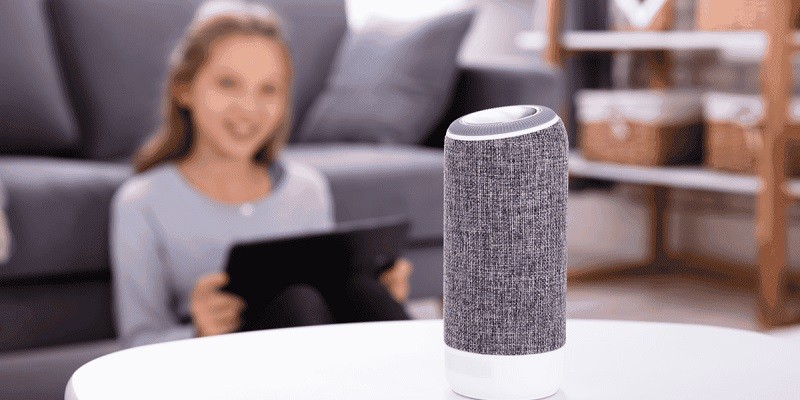Voice Assistants And the Future of Home Automation
Voice assistants are shaping the future of home automation by providing convenient and hands-free control of various devices and systems. With just a simple voice command, users can easily adjust lighting, manage thermostats, control appliances, and even monitor security systems.
As the technology continues to advance, voice assistants are becoming more intelligent and capable, integrating with smart home devices and offering personalized experiences. The seamless interaction between voice assistants and home automation systems is revolutionizing the way we interact with our homes, making it more convenient, efficient, and personalized to meet our needs and preferences.
Whether it’s turning on the lights or adjusting the temperature, voice assistants are becoming an essential tool in creating a smart and automated home environment.
Table of Contents
The Rise Of Voice Assistants

Voice Assistants In Homes
Voice assistants like Alexa and Google Assistant are becoming ubiquitous in modern households. They are designed to simplify daily tasks through voice commands.
Impact On Home Automation Industry
Voice assistants have revolutionized the home automation industry by providing seamless integration with various smart devices. This technology enhances convenience and efficiency for homeowners.
Integration Of Voice Assistants In Home Devices
Smart Speakers
One of the key advancements in home automation is the integration of voice assistants into smart speakers. Smart speakers, such as Amazon Echo and Google Home, have gained significant popularity in recent years. These devices are equipped with voice recognition technology, allowing users to control various aspects of their home with just a few simple voice commands.
With smart speakers, homeowners can perform a wide range of tasks, from playing music and getting weather updates to controlling smart devices in their home. For instance, users can simply say, “Hey Google, turn off the lights” or “Alexa, set the thermostat to 72 degrees,” and the smart speaker will carry out the command.
The convenience and ease of use offered by smart speakers have made them an essential component of any smart home setup. Not only can they streamline daily tasks, but they also provide a hands-free experience, allowing users to multitask and stay productive.
Smart Appliances And Gadgets
In addition to smart speakers, voice assistants are being integrated into various household appliances and gadgets. This integration allows homeowners to control and monitor these devices through voice commands, further enhancing the convenience and efficiency of home automation.
For example, smart refrigerators can be connected to voice assistants like Alexa or Google Assistant, enabling users to check inventory, create grocery lists, and even order groceries online, all by voice command. Similarly, voice-controlled thermostats and smart ovens can be adjusted and operated hands-free, making cooking and temperature management effortless.
The integration of voice assistants in smart devices extends beyond traditional appliances. Smart locks, security systems, and even robot vacuums can now be controlled using voice commands. This integration not only simplifies tasks but also enhances home security and automation.
Overall, the integration of voice assistants in home devices has revolutionized the way we interact with and control our surroundings. With the increasing popularity and advancements in this technology, we can expect even more seamless and intuitive home automation experiences in the future.
Challenges And Concerns
As voice assistants become increasingly integrated into our homes, there are several challenges and concerns that need to be addressed for a seamless future of home automation. In this section, we will explore two key areas that require attention: privacy issues and reliability and security.
Privacy Issues
One of the primary concerns surrounding voice assistants in the context of home automation is privacy. Having a device that constantly listens to our conversations and commands raises questions about the security and protection of our personal data.
Data privacy is a crucial aspect that needs careful consideration as we continue to embrace voice assistants in our daily lives. It is essential for individuals to have full control over the data they share with voice assistants, ensuring that sensitive information remains secure. Transparency regarding data collection and usage becomes paramount in building trust with users.
Additionally, data breaches pose significant risks to personal privacy. Companies that develop voice assistant technologies must invest heavily in robust security measures to prevent unauthorized access to user information. Regular software updates and stringent security protocols are necessary to safeguard against potential threats.
Reliability And Security
Another challenge that needs to be addressed in the future of home automation is the reliability and security of voice assistants. While these technologies have revolutionized the way we interact with our homes, they are not without their flaws.
When it comes to reliability, voice assistants may sometimes misinterpret user commands, leading to frustration and inefficiencies. This issue becomes more apparent when multiple voice assistants are present in the same environment, potentially causing confusion and conflicts in execution.
Furthermore, ensuring the security of voice assistants is crucial to prevent unauthorized access and potential vulnerabilities. Integration with other devices and systems in the home increases the potential attack surface, making it essential to implement robust authentication and encryption mechanisms.
As voice assistants continue to shape the future of home automation, it is imperative to address the challenges and concerns that arise. Prioritizing privacy, reliability, and security will pave the way for a seamlessly integrated and secure smart home experience.
The Future Of Home Automation
The latest advancements in voice technology have revolutionized the way we interact with our homes.
Voice assistants like Alexa and Google Home have made it easier to control devices by simply speaking commands.
Voice technology in home automation has the potential to enhance security, convenience, and energy efficiency.
Imagine unlocking your door, adjusting the thermostat, and turning on the lights all with just your voice.
Frequently Asked Questions
What Is The Role Of Voice Assistants In Home Automation?
Voice assistants, like Amazon’s Alexa and Google Assistant, enable hands-free control of smart home devices.
How Do Voice Assistants Improve Home Automation?
Voice assistants streamline control of smart devices, offering convenience and enhancing the user experience.
What Devices Can Voice Assistants Control In Home Automation?
Voice assistants can control a wide range of smart home devices including lights, thermostats, locks, and more.
How Secure Are Voice Assistants In Home Automation?
Voice assistants use advanced security measures to protect user data and ensure safe home automation control.
What Is The Future Outlook For Voice Assistants In Home Automation?
Voice assistants are expected to play an increasingly integral role in home automation, offering ever-improving functionality and convenience.
Conclusion
Voice assistants signal an exciting shift in home automation. Seamlessly integrating technology into our daily routines is now a reality. With convenience and efficiency at the forefront, homes are becoming smarter than ever. Embracing this innovation paves the way for a more connected and streamlined future.

